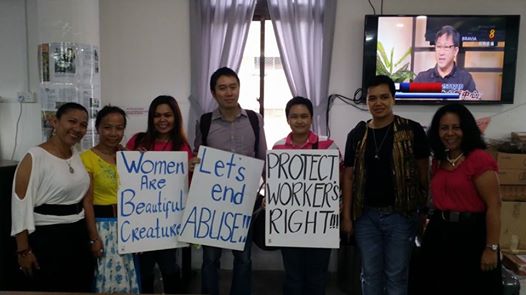HOME held a consultation session in Yangon with civil society groups there and the Myanmar Overseas Employment Agencies Federation (MOEAF) last month. It was co-organised with MWRN (Migrant Workers Rights Network) and the 88 Generation Peace and Open Society, in anticipation of a Memorandum of Understanding that will soon be signed between the Association of Employment Agencies Association Singapore and MOEAF. The outcome of the consultation resulted in the following recommendations:
Recommendations from Consultation Session
26 August 2014
Karuna Daw Clinic, 167 Kyun Taw Road, San Chaung, Yangon, Myanmar
Attending Organizations
- Myanmar Overseas Employment Agencies Federation
- The 88 Generation Peace and Open Society
- MWRN (Migrant Workers Rights Network)
- Myanmar Maritime Workers’ Federation
- Myanmar Trade Union Federation
- Lin High Power Employment Agency
- Danish Church Aid
- Phan Tee Ain
- Humanitarian Organization for Migration Economics (HOME)
General Recommendations
- To set up information centres on migration and overseas works across Myanmar by Ministry of Labour
- To provide holistic information about the domestic work (including the respective ministries’ regulations for domestic workers and the do’s and don’ts for both worker and employer) as well as information on available help and services for migrant workers in receiving countries – to be done in collaboration between Ministry, MOEAF and migrant & labour rights organizations
- To create job opportunities domestically and to set minimum wage for workers as soon as possible
- To lessen or simplify the procedures needed for migration, migrant work and finding job opportunities in foreign countries.
- To include migrant workers and seafarers under social security protection for workers
- To strengthen the collaboration between respective government departments in case of migrant worker issues
- To start education about migration and related issues in the schools
- To implement the measures systematically as set out in the policy papers
- To start SMART Card System as a measure to prevent illegal sending of domestic workers
- To find (other) measures to prevent sending of domestic workers by illegal and un-registered agents
- To seek assistance from media and CSOs in raising awareness about foreign domestic worker issues
- To find ways to send the domestic workers’ needs and demands to the respective government departments
- To draft, and to try to pass the law which can effectively protect the rights of domestic workers in foreign countries
- To include domestic workers’ demands and feedback in drafting the MoU between MOEAF and AEA(S)
- All stakeholders to participate in changing the public (mostly negative) attitude towards domestic work in foreign countries
Points/Clauses to be included in MoU between MOEAF and AEA(S)
- Accountability and responsibilities of respective employment agencies are to be stipulated in detail in the MoU
- Care centre and facilities for domestic workers are to be set up by AEA(S) and MOEAF with the help of respective ministries and embassies
- SMART Card is to be issued only to those who completed the pre-departure training by registered agencies or training centres
- AEA(S) to propose to Ministry of Manpower Singapore to issue IPA/Work Permit only to those who can submit the SMART Card issued by Myanmar side
Points/Clauses which MOEAF will consider to be included in MOU
- To add clause which will prevent contract substitution in Singapore
- Employment contract is to be written in both Myanmar and English
- To add clause which will ensure that employer provide culturally appropriate and adequate food for domestic worker
- To add clause which will ensure the basic language (English) training is adequately provided in pre-departure training
- To add clause which will ensure the worker’s freedom to pray and other religious rituals
- To add clause which will ensure the worker’s right to use mobile phone freely
- To add clause which will prohibit the employer from asking the worker to do any work during her rest day or day off
- To add clause which requires employer to give minimum one month notice for termination of employment contract
Recommendations for Singapore Government
- To include domestic workers in Employment Act and Work Injury Compensation Act
- To enact legislation that domestic workers will not be charged for placement fees
- To allow domestic workers freedom to switch employers without employer’s consent


